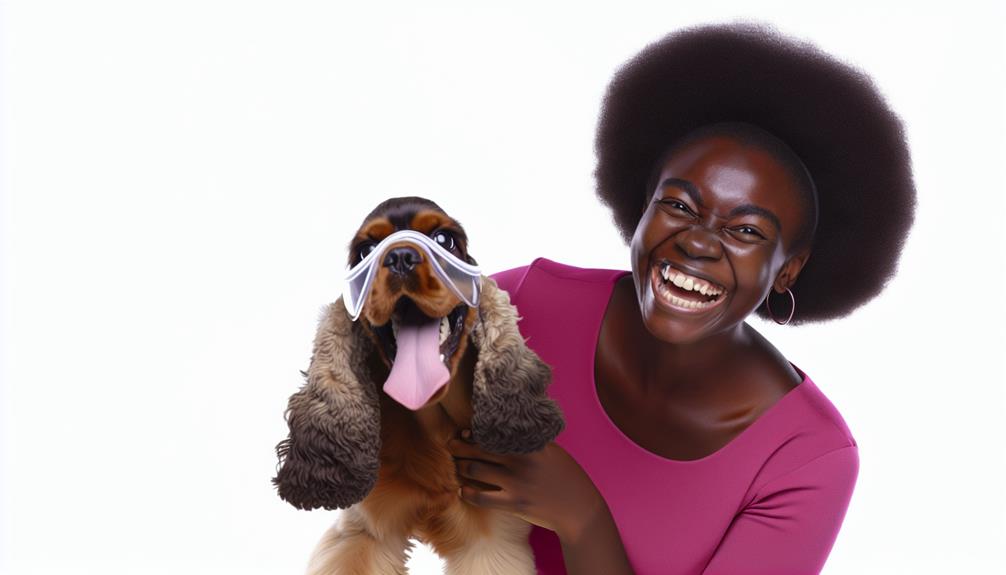
18 Apr Cocker Spaniels: Hypoallergenic Facts
If you've ever wondered about Cocker Spaniels and their hypoallergenic status, there's much to uncover. Despite their charming demeanor, these dogs might not be the best choice for those with allergies. Understanding the nuances of Cocker Spaniel shedding and dander production can shed light on managing potential allergens. Dive into the world of grooming, bathing, and coat care to navigate through the complexities of owning a Cocker Spaniel in light of allergies.
Cocker Spaniel Shedding Facts
Cocker Spaniels, with their double coat, exhibit moderate shedding that can be managed through regular grooming practices. Shedding in Cocker Spaniels tends to increase during the fall and spring seasons, so it's essential to be prepared for these times.
While trimming the coat of your Cocker Spaniel can help maintain their appearance, it's crucial to understand that it doesn't eliminate shedding altogether. The amount of shedding can vary from one Cocker Spaniel to another, so what works for one dog may not be as effective for another.
Grooming Tips for Cocker Spaniels
When it comes to grooming your Cocker Spaniel, remember that coat care is essential for their well-being and appearance.
Brushing techniques using a slicker brush can maintain their beautiful, flowing fur. Pay special attention to untangling any snarls gently to prevent discomfort during grooming sessions.
Coat Care Essentials
Are you ready to unlock the secrets to maintaining the luxurious coat of your beloved Cocker Spaniel with essential grooming tips? Cocker Spaniels require special care due to their delicate skin and double coat structure. Regular grooming with a slicker brush is crucial to prevent matting and tangling, ensuring the flowing and feathery look of their coat. Daily brushing not only maintains their coat's beauty but also helps in managing shedding effectively. When untangling any snarls, be gentle near their ears to avoid discomfort. By prioritizing proper coat care, you can keep your Cocker Spaniel looking and feeling their best.
| Coat Care Essentials for Cocker Spaniels |
|---|
| Regular grooming with a slicker brush |
| Daily brushing for a flowing coat |
| Gentle untangling to prevent discomfort |
| Caution near delicate skin and ears |
Brushing Techniques
To ensure the optimal grooming experience for your Cocker Spaniel, start by selecting a high-quality slicker brush designed specifically for their feathery coat. Daily brushing with a slicker brush helps prevent matting and tangles, maintaining your pup's coat in top condition.
Carefully untangle any snarls you encounter to keep your Cocker Spaniel clean and comfortable. Be gentle around their ears, as this area is sensitive.
Regular grooming not only distributes natural oils, reducing shedding and promoting a healthy coat but also minimizes allergens and the risk of allergic reactions. By incorporating proper brushing techniques into your routine, you're not only caring for your Cocker Spaniel's appearance but also their overall well-being.
Managing Cocker Spaniel Allergies
Regular grooming and proper hygiene practices are essential for managing Cocker Spaniel allergies effectively. As Cocker Spaniel owners, you must understand that these adorable pups can produce dander and allergens that may trigger allergic reactions.
By keeping up with regular grooming routines, such as brushing your Cocker Spaniel's coat to reduce shedding and dander, you can significantly minimize allergen spread in your home. Additionally, bathing your furry friend 2-3 times a week can further help in reducing allergens present in their coat.
To create a hypoallergenic environment, consider removing heavy rugs and curtains that can trap dander. Washing your pet's bedding and blankets frequently is also crucial to decrease allergens in the environment. Remember, proper care and hygiene practices play a vital role in ensuring a comfortable and allergy-free living space for both you and your beloved Cocker Spaniel.
Bathing Recommendations for Cocker Spaniels
Managing allergies in your Cocker Spaniel extends beyond grooming routines; proper bathing practices are key to reducing dander and allergens in your furry companion's coat. Bathing your Cocker Spaniel 2-3 times a month is recommended to maintain a clean and healthy coat. Using a gentle dog shampoo specifically formulated for dogs can help preserve the skin and coat health of Cocker Spaniels. The bathing frequency may vary depending on your Cocker Spaniel's activity level and exposure to the outdoors. Regular baths not only aid in reducing dander and allergens but also play a crucial role in preventing matting in your Cocker Spaniel's long, flowing coat. For personalized advice on the best bathing schedule and products suitable for your Cocker Spaniel, consider consulting with a professional groomer who can provide valuable insights.
| Bathing Recommendations for Cocker Spaniels | |
|---|---|
| Frequency | 2-3 times a month |
| Shampoo | Gentle dog shampoo |
| Benefits | Reduces dander and allergens |
| Prevention | Prevents matting in the coat |
| Consultation | Seek advice from a professional groomer |
Cocker Spaniel Coat Care Guide
Ensure your Cocker Spaniel's coat radiates health and beauty with a comprehensive care guide tailored to their unique grooming needs. To keep your furry friend looking and feeling their best, follow these essential tips:
- Regular Brushing: Brush your Cocker Spaniel's coat at least a few times a week to prevent matting and tangles, especially in their feathery fur.
- Proper Bathing: Bathe your Cocker Spaniel every 4-6 weeks using a mild dog shampoo to keep their coat clean and smelling fresh.
- Trimming and Grooming: Schedule regular grooming sessions every 6-8 weeks to trim their coat, clip their nails, and clean their ears for overall hygiene.
- Shedding Management: During shedding seasons, increase brushing frequency to control loose fur and reduce allergens in the environment.
Hypoallergenic Dog Breeds Comparison
To understand the benefits of hypoallergenic dog breeds, let's explore how certain breeds can minimize allergic reactions and create a more comfortable environment for allergy-sensitive individuals.
When comparing hypoallergenic breeds like Maltese, Poodles, and Bichon Frises to non-hypoallergenic breeds, the key lies in their minimal shedding and dander. These breeds produce fewer allergens, reducing the likelihood of allergic reactions in sensitive individuals.
While it's essential to note that no dog breed is entirely hypoallergenic, opting for hypoallergenic breeds such as Portuguese Water Dogs can significantly lower the chances of triggering allergies. By choosing a hypoallergenic dog, like a Cocker Spaniel, you may experience fewer allergic responses, making it easier to enjoy the companionship of a furry friend without discomfort.
Regular grooming practices, such as frequent baths and brushing, play a crucial role in managing allergens and keeping the environment allergy-friendly for both you and your beloved pet.
Cocker Spaniel Allergy Management Strategies
To effectively manage allergies in your Cocker Spaniel, regular grooming is essential to reduce allergens in their coat and minimize allergic reactions.
Controlling the environment by washing their bedding and removing heavy rugs and curtains can help decrease dander levels.
Additionally, considering a suitable diet tailored to address allergies can further aid in managing your Cocker Spaniel's sensitivities.
Grooming for Allergies
For effective management of Cocker Spaniel allergies, prioritize regular grooming to minimize dander and allergen accumulation in their coat. Daily brushing is key to preventing matting and tangling, reducing allergen exposure.
Utilizing a slicker brush can effectively remove loose fur and dander, keeping your Cocker Spaniel's coat clean and allergen-free. When untangling snarls, handle them carefully to prevent shedding and the spread of allergens. Remember to be cautious around their ears, as Cocker Spaniels have delicate skin that requires gentle grooming.
Environment Control Tips
Maintaining a meticulous cleaning routine in your living space can significantly alleviate Cocker Spaniel allergies by reducing dander and allergen presence. Vacuum and dust frequently to control allergens.
Regularly wash your Cocker Spaniel's bed and blankets to reduce allergen build-up. Remove heavy rugs and curtains that trap dander, benefiting those with Cocker Spaniel allergies.
Opt for lighter fabrics that are easier to clean and don't accumulate allergens. To minimize allergic reactions, prevent allergen transfer by not allowing your Cocker Spaniel to sleep in your bed.
These simple environment control tips can make a significant difference in managing Cocker Spaniel allergies effectively and creating a more comfortable living space for both you and your furry companion.
Diet Considerations for Allergies
Enhancing your Cocker Spaniel's well-being and minimizing allergic reactions starts with making thoughtful dietary choices. When considering a hypoallergenic diet for your Cocker Spaniel, remember these key points:
- Opt for dog food with limited ingredients to decrease potential allergens.
- Collaborate with your veterinarian to devise a customized diet plan tailored to your Cocker Spaniel's allergies.
- Steer clear of common allergenic ingredients such as wheat, corn, and soy in your Cocker Spaniel's meals.
- Introduce novel protein sources like duck, venison, or salmon to help reduce allergic responses in your furry companion.
Cocker Spaniel Health Considerations
When considering the health of Cocker Spaniels, it's crucial to be proactive in addressing common issues such as ear infections, hip dysplasia, and allergies. Regular grooming plays a vital role in preventing matting and maintaining their medium-length coat, which sheds moderately. The flowing, feathery coat of Cocker Spaniels comes in various colors, adding to their charm but requiring attention to avoid tangles. Allergies associated with Cocker Spaniels are often triggered by their dander and saliva, necessitating a clean environment and proper hygiene practices.
To ensure your Cocker Spaniel's well-being, schedule routine check-ups with your veterinarian and pay close attention to signs of discomfort or illness. Be mindful of any changes in behavior, appetite, or mobility that could indicate underlying health issues. By staying informed about common health concerns and taking preventive measures, you can help your Cocker Spaniel lead a happy and healthy life, free from unnecessary discomfort.








No Comments